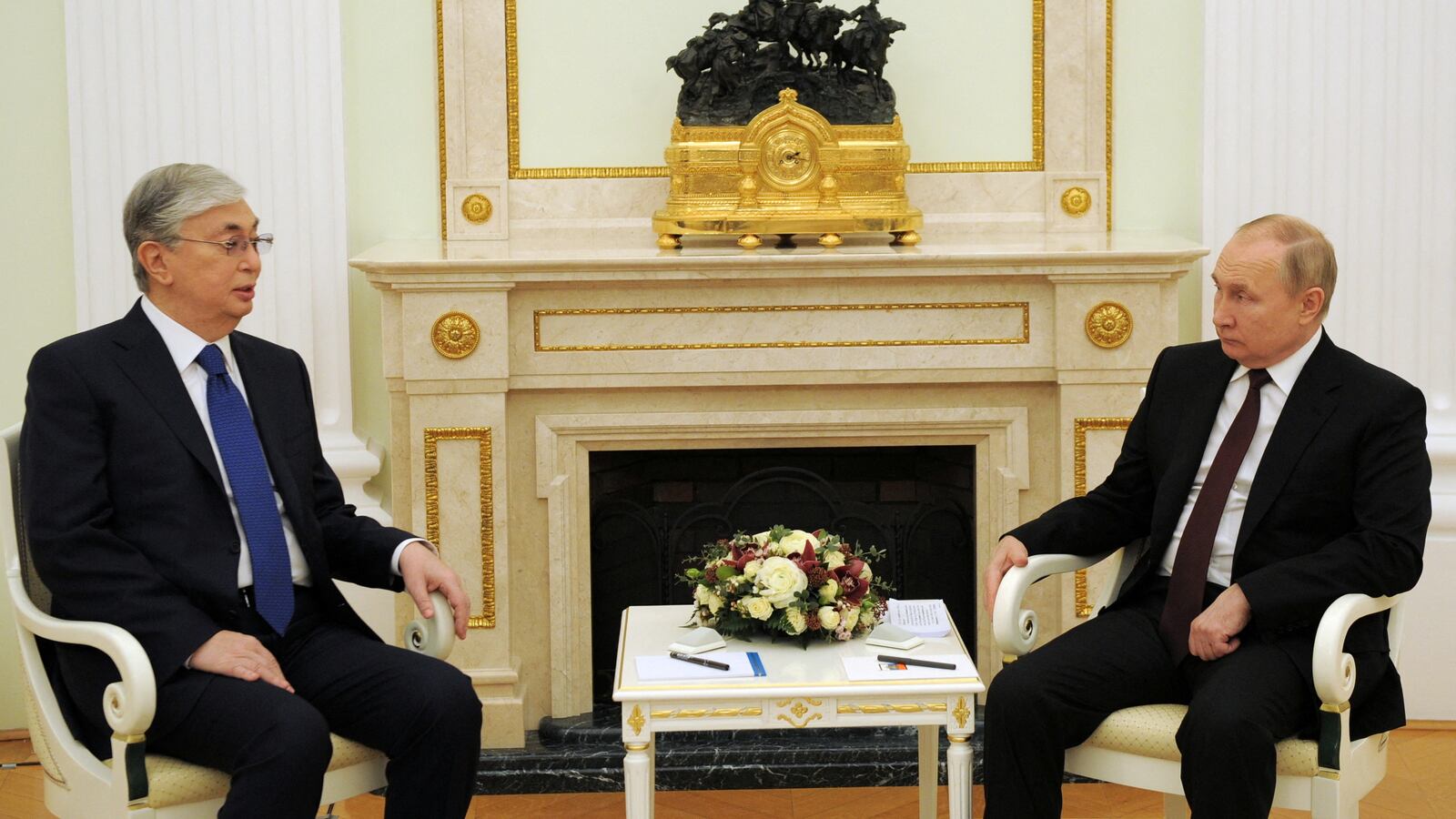The president of Kazakhstan, Kassym-Jomart Tokayev, took a sharp tone against Russian efforts to further envelope allies under Moscow’s influence, just as the Kremlin signed an agreement to deploy Russian nuclear weapons in Belarus.
Speaking near Russian President Vladimir Putin on stage at an event in Moscow, Kazakh President Tokayev warned against political integration within Russia-led Eurasian Economic Union (EAEU), of which Kazakhstan, Russia, and Belarus are each members. Kyrgyzstan and Armenia are also in the union.
From the outset of the event, Kazakhstan and Belarus indicated interest in collaboration in the economic realm, but not in the political space.
But in reality, Belarus and Russia have been working together for years to form a “union state,” in which Minsk and Moscow work to meld together their governments, cultures, militaries, and economies. Just this Thursday, Russia’s Defense Minister Sergey Shoigu and Belarus’ Defense Minister Viktor Khrenin both signed an agreement on deploying Russian nuclear weapons to Belarus, albeit under the control of Russia.
“We have a union state in the EAEU,” Tokayev said of the Belarusian and Russian arrangement. “The creation of a state according to the formula ‘two countries, one state,’ with a single political, legal, military, economic, monetary, cultural and humanitarian space, with a single union government and a single union parliament."
“I apologize, but even nuclear weapons are one for two now,” Tokayev added. “I think we need to discuss this problem.”
Putin, who was sitting on stage while Tokayev spoke Thursday, raised his eyebrows and smirked at the comment, according to footage from the event shared on social media.
The current leader of Belarus, Alexander Lukashenko, who was sitting next to him, laughed, exchanged glances with Putin, and appeared to mumble something under his breath.
Putin’s transfer of nuclear weapons to Belarus is one part of a larger plan from Russia to further weave together Russian and Belarusian military operations. Belarus served as a launchpad for Russia’s invasion of Ukraine last year, and since then has promised to continue allowing Russian military forces to use Belarus to prepare for military operations in Ukraine.
“Russia isn’t handing over its nuclear weapons to the Republic of Belarus: the Russian side will control them and make decisions about using them,” Shoigu said, according to Meduza.
Kazakhstan’s concern about Belarus’ and Russia’s Union State arrangement is just the latest sign that Russia’s leadership in its dwindling circle of allies could be coming untethered.
Earlier this week, the prime minister of Armenia, Nikol Pashinyan, announced that he could withdraw his country from the Collective Security Treaty Organization (CSTO), the Russian-led military alliance. Some officials in China, a key Russian partner, reportedly refused to meet with a top Russian official during a trip to Beijing and Shanghai this week. India has been urging Russia to pursue peace in Ukraine and to avoid nuclear weapons use in the war.
Kazakhstan has been pushing back on aspects of Russia’s war in Ukraine since the outset, with officials appearing to grow increasingly cautious of endorsing Putin’s foreign policy and military operations. Kazakh Foreign Minister Mukhtar Tileuberdi refused to recognize the sovereignty of the territories Russia seized and illegally annexed from Ukraine during the war last year.
Other world leaders also warned against the transfer of Russian nuclear weapons to Belarus on Thursday. Belarus’ democratically-elected opposition leader, Sviatlana Tsikhanouskaya, warned Thursday that the move could further enable Russia to hold at risk more territory while it continues to wage war in Ukraine, posing a major threat to Ukraine and the rest of Europe.
The move also could further solidify Russia’s efforts to control Belarus, which the opposition has begun referring to as a partial occupation of Belarus.
“We must do everything to prevent Putin’s plan to deploy nuclear weapons in Belarus,” Tsikhanouskaya said. “It directly violates our constitutional non-nuclear status & would secure Russia’s control over Belarus for years ahead. And it would further threaten the security of Ukraine & all of Europe.”





